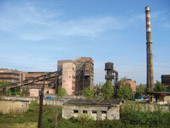Workers strike in Imereti over health concerns and poor wages
By Shorena Labadze
Friday, March 7

The Pero factory in Zestaponi, a town in western Imereti province, ground to a halt on March 4 as nearly 2000 workers went on strike to protest low wages and alleged health hazards at the plant.
Two weeks ago, striking workers say, they warned of a walk-out if the factory didn’t improve working conditions and raise salaries.
Yesterday, regional officials reported, the strike ended—but employees say they were confronted with strikebusters.
Factory administration say they don’t have the option of increasing salaries.
“We are practically working just for fun, as our wages are very low,” one employee told the newspaper. “We have families, and we simply can’t make ends meet. One shouldn’t forget that our job directly affects our health. The materials we’re working with have an awful impact [on our health].”
The Pero factory, a major local employer, smelts iron and magnesium to make ferroalloys, and is infamous in Zestaponi for belching dark red smoke all over the area.
The employee said most workers are making GEL 180–200 a month. There was a brief bonus of GEL 17, he said.
“After this so-called raise they cut our salaries by 25 percent,” the worker said.
The Labor Party is supporting the strike, with party leaders calling for workers’ salaries to be increased by half.
“The Ukrainian investor [which owns the factory] is making the employees work in the most severe conditions. We call on Mikheil Saakashvili and his government to pay attention to the awful situation in the factory,” local Labor representative Giorgi Goglichidze said at a March 5 press conference.
Doctors say long-term exposure to the magnesium in the factory can cause a set of symptoms which include kidney and nerve damage. Locals worry that the factory, which also works with silicon, is exposing workers to carcinogens.
Zestaponi residents also complain of layers of red dust from the metals settling on orchards.
Workers in the plant say the air filtration system is usually left off to save on utilities costs. Factory administration said that air filtration system, which costs GEL 3000–3500 to run each hour, is left off at night to cut costs.
Hamlet Vashadze, a former Pero employee, says the factory was taken over last year by a joint English-Ukrainian venture, Georgian Manganese.
“Since then, the technical and economic situation [in the plant] has gotten extremely worse,” he told the newspaper.
The government of Imereti province, Kako Bobokhidze, met with the striking workers, pledging to deal with the health concerns surrounding the factory and to broker a salary increase.
“We reached an agreement with factory administration that the workers’ salary will increase by 22 percent,” Bobokhidze said. “We would be glad, of course, if there was the chance to raise wages by half, but we have to listen to the factory’s investors as well.”
The air around Zestaponi is polluted, Bobokhidze acknowledged, but he says factory management promised to spend GEL 30 million to deal with the environmental hazards.
“We support the increase of wages,” Zestaponi city council chief Givi Arabidze said. “The manganese dust is filtrated by [a system] under construction. We all need to stay patient, though the workers’ demands make sense, of course.”
Late yesterday, factory employee Roin Tabatadze said the factory’s security guards forced the strikers back to work after the plant administration offered a 21 percent raise.
“A 21 percent raise is almost nothing for our salaries,” he said. “We are going to fight for [a] 50 percent [raise].”
Tabatadze said the strike will restart on March 18.
